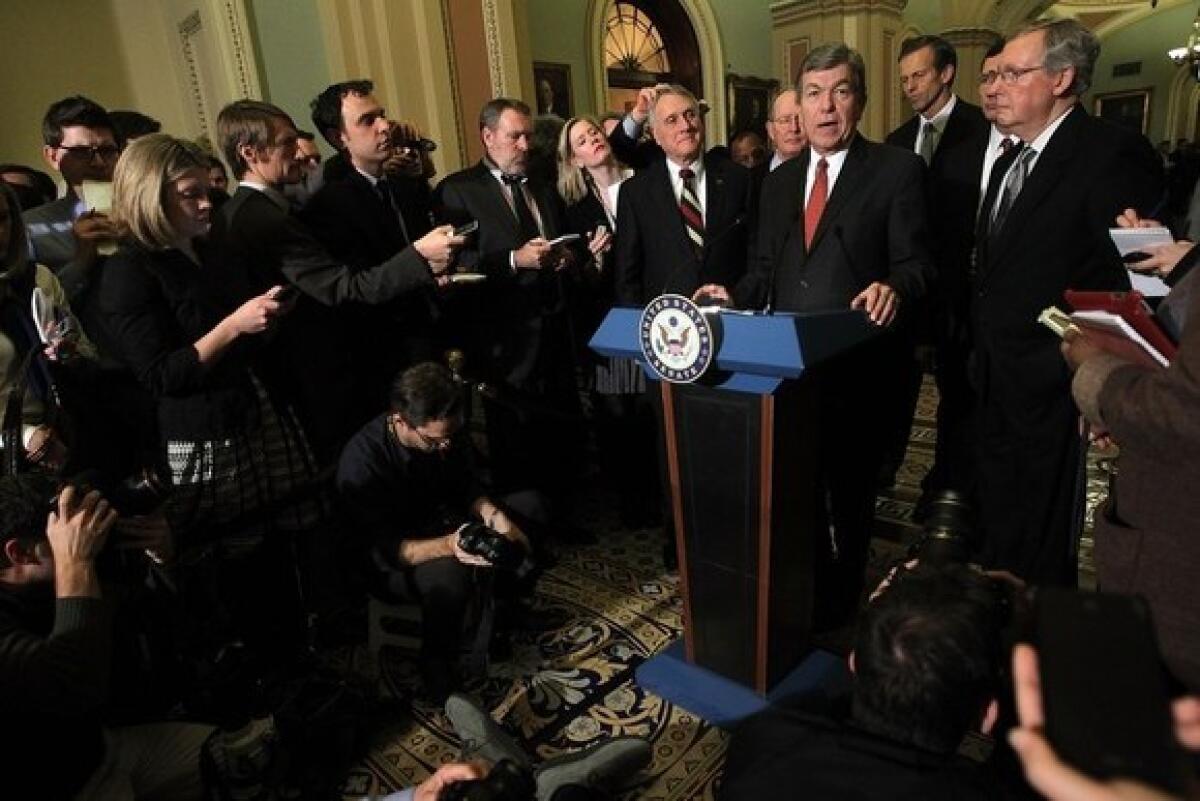Senate rejects dueling balanced budget amendments

Sen. Roy Blunt and other members of the Republican leadership speak with reporters after the weekly Republican policy luncheon Tuesday on Capitol Hill.
The Senate on Wednesday rejected two different versions of a balanced budget amendment to the Constitution, unceremoniously dispensing with the final task of this summer’s hard-fought debt ceiling and deficit reduction deal.
The votes represent another piece of the debt deal that came and went without action this year.
The deal’s centerpiece, a bipartisan “super committee” of Congress, fizzled last month without outlining a proposal for long-term deficit reduction. The failure will trigger a set of automatic budget cuts next year, although many in Congress are working to prevent those from kicking in.
As the year winds down, the price tag for raising the debt limit and avoiding default appears to have been an agreement to cut $1.2 trillion in spending over 10 years, far less than Republicans had aimed for.
The votes on a balanced budget amendment were inserted in the deal to appease reluctant conservatives in the House. But the votes largely were viewed more as a political weapon than a moment for policy change.
Although nearly all Republicans have aligned behind the popular idea of mandating the federal government balance its books, Democrats are more divided, making passing such an amendment out of a divided Congress unlikely.
With a high bar for passage, the amendment did not pass the Republican-led House when it came up for a vote last month.
The two proposals on the floor on Wednesday represented two competing approaches to the amendment – as well as a chance for political cover.
The Republican amendment, sponsored by Sen. Orrin Hatch, (R-Utah), would require a two-thirds vote for Congress to agree to spend more than it takes in or to raise taxes. It would cap federal spending at 18% of gross domestic product, a six percentage point drop from the current level, and prohibit the courts from forcing Congress to raise taxes to balance the books.
Hatch argued the amendment would force not just fiscal discipline but a new commitment to a narrower mission for government.
“This is not just a balanced budget amendment,” he said. “It’s a constitutional amendment for limited government.”
The White House issued a statement opposing the amendment, saying it would “set a severe and unrealistic spending cap that would undercut the federal government’s ability to meet its core commitments to seniors, middle class families and the most vulnerable, while reducing our ability to invest in our future.”
The amendment failed on a 47-53 partisan vote.
The Democratic alternative, offered by Sen. Mark Udall (D-Colo.) would allow Congress to more easily override the restrictions and would make it more difficult for Congress to cut taxes.
The amendment prohibited Congress from cutting income taxes on those making more than $1 million. It also aimed to protect Social Security by taking the trust fund off the books, prohibiting a court for ordering that Congress reduce benefits.
Udall said his measure was aimed at finding “common ground.”
“It creates flexibility, depending on the economic condition we face and the year in which we find ourselves,” he said.
The measure was soundly rejected on a 21-79 vote, with nearly all Republicans voting against it, along with 31 Democrats and two independents.
More to Read
Start your day right
Sign up for Essential California for news, features and recommendations from the L.A. Times and beyond in your inbox six days a week.
You may occasionally receive promotional content from the Los Angeles Times.







